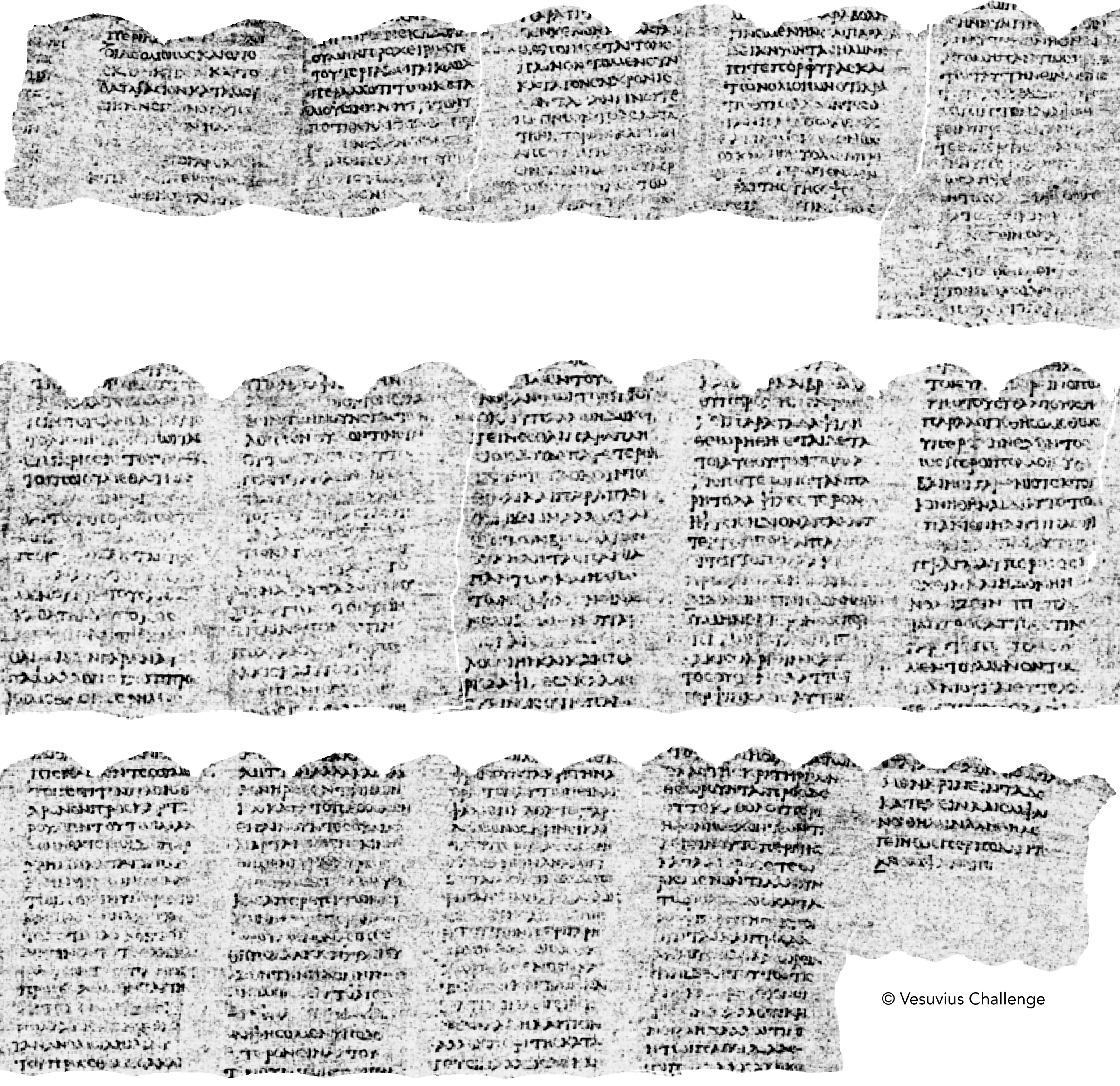
Vesuvius Challenge grand prize winners announced
February 05, 2024
The Vesuvius Challenge has announced the grand prize winners of its global AI contest to virtually unwrap a still-rolled carbonized papyrus scroll from the ancient city of Herculaneum. The virtual unwrapping software utilized in the contest was developed by Pigman Endowed Professor of Heritage Science Brent Seales.

The Vesuvius Challenge has announced the grand prize winners of its global AI contest to virtually unwrap a still-rolled carbonized papyrus scroll from the ancient city of Herculaneum.
Youssef Nader, an Egyptian biorobotics graduate student in Berlin, led the winning team that also includes Luke Farritor, a 21-year-old SpaceX intern and college student from Nebraska, and Julian Schilliger, a robotics student from Zurich.
Farritor won the Vesuvius Challenge “First Letters Prize” last October, and Youssef placed second. Schilliger was also a prior winner of three Vesuvius Challenge “progress prizes” for his work on the Volume Cartographer — the virtual unwrapping software developed by Brent Seales, a computer science professor at the University of Kentucky, and used in the contest.
“The grand prize contestants have clearly demonstrated what our systematic experimental framework envisioned: that virtual unwrapping and AI techniques together can deliver substantial texts from within the still-rolled Herculaneum scrolls,” Seales said. “My hope is that all the Vesuvius Challenge contestants will consider the experience as a career-high moment. Their contributions, hard work and creativity have certainly catalyzed an exciting new phase of revelation and scholarship. The University of Kentucky team of researchers who built the software, collected the data, pioneered the science and formed the many varied collaborative partnerships required to enable this moment should also be immensely proud.”
The three will split the $700,000 grand prize for their winning entry, which reveals 15 partial columns of hidden text hidden within PHerc.Paris4. The scroll is one of several owned by the Institut de France.
To authenticate the findings, expert papyrologists assessed each letter shape. Those on the review committee represent the countries who currently possess scrolls from Herculaneum (England, France and Italy).
“Papyrus scrolls can contain more than 200 columns of text, so we have to bear in mind that what we know about this text will be hugely increased by the next results of virtual unwrapping. That being said, we have the lucky opportunity to read the final columns of the scroll, where the author would often summarize the content of his work or introduce new topics that he would address in subsequent books of the same work,” Federica Nicolardi, assistant professor in papyrology at the Università degli Studi di Napoli Federico II, continued.
“There is a clear discussion on pleasure, particularly on the fact that the availability of goods, such as food, does not affect the pleasure which they provide. It’s an interesting discussion that emphasizes a difference in quantity does not necessarily imply a difference in quality/value/pleasantness too.”
In March 2023, Seales (in partnership with EduceLab: A Digital Restoration Initiative, the Library of the Institut de France and founders of the Vesuvius Challenge) launched the global competition to combine the best minds and talent in AI, virtual unwrapping and papyrology to accelerate the discovery of texts hidden within the Herculaneum scrolls.
The original $200,000 prize offering expanded into a $1 million total prize —thanks to contributions from more than 30 individuals that ranged from $5,000- $450,000.
Seales believes reading the entire collection of Herculaneum scrolls is not only possible, but will be the largest discovery from the ancient world to date.
“Indeed, today in collaboration with the Vesuvius Challenge, the dream from 20 years ago has come to life in the form of a new, readable Herculaneum text,” Seales said. “The Epicureans had much to say about pleasure and pain, and even in this text, there is a discussion of how abundance and scarcity can affect our pleasure: do things that are scarce provide more pleasure than those things that are abundant? The question is interesting and apropos. Those of us who have worked to see the success of virtual unwrapping as applied to Herculaneum recognize this as a deeply gratifying moment that may be scarce but is tremendously satisfying.”
A detailed timeline of the project can be found here. Additionally, for more information about the grand prize, visit Scrollprize.org.